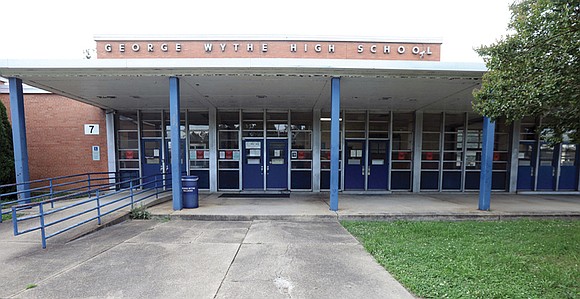Teen shootings raise questions about school attendance
Jeremy M. Lazarus | 5/4/2023, 6 p.m.

Another shooting involving Richmond students has once again focused attention on the high level of truancy the city schools experience.
The latest gunfire incident around noontime April 27 involved two truant George Wythe High school students, both left injured. An 18-year-old has been arrested in the case.
Acting Police Chief Richard “Rick” Edwards suggested at a vigil for the students organized by the Police Department that the shooting followed an argument among the three individuals who apparently were hanging out in a wooded area on the edge of the Wythe campus, about a football field west of the building.
Had the two students been in class rather than skipping school as thousands of students do every day, a shooting likely would have been avoided, city and school leaders noted.
This incident follows an incident in March involving three students being wounded in off-campus shootings, while another student was accidentally shot to death outside school while filming a video for social media about having a weapon.
The truancy issue might have helped expose more students to situations that would allow them to be victims or cause trouble outside schools, in the view of some.
In a January report, Richmond Public Schools notified the School Board that one in four students or about 5,000, are chronically absent, meaning they miss 10 or more days of school, or just about the same rate as a year earlier.
The report highlighted the situation for each school. Among high schools, George Wythe was listed as having 29 percent of its students chronically absent. Three other high schools, Armstrong, Huguenot and John Marshall, also listed 25 percent or more of students who were regularly missing classes.
Fifth District City Councilwoman Stephanie Lynch has sought to highlight the issue as chair of the Education and Human Services Committee, calling it “a crisis that is not being addressed. Since October, Ms. Lynch, has urged the School Board and City Hall to start collaborating on solutions to increase school attendance.
And she also has advocated that schools revisit having truancy officers to track down and check on missing students four years after the board at the request of Superintendent Jason Kamras eliminated that operation in 2019.
In an email, to Stephanie Rizzi, School Board chair and the representative for the 5th District, Ms. Lynch noted that during a recent visit to an apartment complex across from the school, she saw at least 30 children of elementary- and middle-school age running around the complex.
“While there may be other systems in place to address absen- teeism but we’re not seeing results on the ground after multiple years, then I question whether we’ve got the right system in place,” Ms. Lynch stated.
She added that Henrico has adopted the same model that Richmond had, and it seems to be working.
However, the idea of reviving truancy officers in Richmond has gone nowhere. The School Board did not make improving attendance a top priority in the current budget now under review, nor did the superintendent recommend that it do so.
School Board member Jonathan Young, 4th District, also has expressed concern about truancy of students from Huguenot. He said that about 125 students leave the high school each day to avoid classes.
In the wake of the shootings, he presented to the School
Board his proposed 10-part plan to improve school safety and security.
His ideas range from barring students from using cell phones during class to extending the school day 30 minutes to provide a “play period” for students. Noting that 43 weapons have been confiscated from students, he also called for expulsion of students discovered to be armed and wants to see an increase in random drug and weapons sweeps in buildings.
Yet, none of his ideas focused on the attendance problem.
Meanwhile, Mayor Levar M. Stoney has won council support to boost spending on after-school programming for city children as part of a youth violence prevention package.
However, neither the mayor nor anyone on council sought to create a link between the initiatives the city is paying to the school attendance situation.






